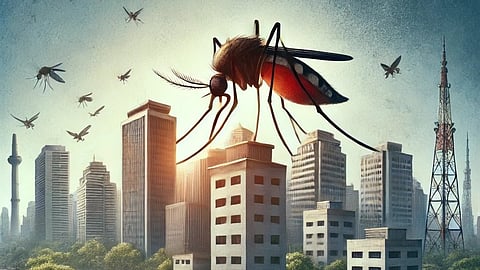
Bhopal- Following the end of the monsoon season, there has been a rapid increase in dengue cases in Madhya Pradesh. Many districts are witnessing a continuous rise in new dengue patients, particularly in major cities like Gwalior, Bhopal, and Indore, where the situation is serious. In September alone, Gwalior was the most affected, reporting 667 cases. This figure is alarming, as a total of 880 dengue cases have been recorded so far, including 306 patients under the age of 17. Tragically, four children have died from dengue, worsening the situation further.
Gwalior is experiencing the highest outbreak of dengue. According to September data, the detection of 667 dengue-positive patients has posed a significant challenge to health services in this city. Health department officials in the district have noted a rapid increase in dengue cases among children, raising serious concerns. Doctors have stated that the rapid decline in platelet counts in patients suffering from dengue fever exacerbates the situation, putting patients' lives at risk if timely treatment is not administered.
Bhopal has also seen a rise in dengue cases. However, the municipal corporation is continuously working on mosquito control measures. Recently, the Bhopal Municipal Corporation launched a fogging campaign using 12 fogging machines across various areas of the city. During the fogging process, pesticide smoke was released to control mosquito breeding and reduce the risk of dengue infection. Officials from the municipal corporation noted that continuous rainfall has led to waterlogging issues, creating favorable conditions for mosquito proliferation.
Dengue is a viral disease transmitted through the bites of infected mosquitoes. The female Aedes aegypti mosquito is responsible for spreading the virus, and it is most active during the daytime, breeding in clean water. Dengue fever typically begins suddenly and presents symptoms such as high fever, headache, muscle and joint pain, pain behind the eyes, vomiting, and skin rashes. If not treated in time, dengue can develop into Dengue Hemorrhagic Fever (DHF) or Dengue Shock Syndrome (DSS), both of which can be fatal.
Rapid Decline in Platelet Counts
The number of platelets in dengue patients drops rapidly, weakening the body's immune system. Therefore, an ELISA test is conducted to confirm dengue, which helps accurately identify the infection.
The health department has urged the public not to take any fever lightly and to seek medical advice immediately. The department has recommended several important precautions to avoid dengue:
Prevent Water Accumulation: Ensure that there is no stagnant water around homes and nearby areas, as mosquitoes breeding in clean water cause dengue. Regularly clean coolers, pots, and tanks.
Use Mosquito Nets and Repellents: Use mosquito nets while sleeping and apply mosquito repellent creams or sprays.
Wear Protective Clothing: Wear long-sleeved clothes to protect against mosquito bites and keep the body as covered as possible.
Fogging and Cleanliness: Demand fogging campaigns in your area and participate in community cleanliness drives to prevent the spread of mosquitoes.
Given the rising dengue cases, the Madhya Pradesh government has intensified fogging and mosquito control campaigns in various locations. However, despite these efforts, dengue cases continue to rise. Health department officials believe that post-rainwater accumulation and garbage accumulation are accelerating mosquito breeding, making it difficult to control the situation.
The role of both government and non-government organizations is crucial in combating dengue. Only through coordination among the municipal corporation, health department, and local administration can diseases like dengue be prevented. Moreover, public awareness and vigilance also play a vital role in fighting this disease.
Doctors are appealing to the public as dengue outbreaks are rapidly spreading in Madhya Pradesh, particularly affecting Gwalior, Bhopal, and other districts. Although various steps are being taken at the government level to control the rising dengue cases, tackling this disease entirely will be challenging without individual vigilance and community cooperation.
You can also join our WhatsApp group to get premium and selected news of The Mooknayak on WhatsApp. Click here to join the WhatsApp group.